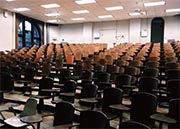
Regional Center for Next Generation Manufacturing (RCNGM)
nextgenmfg.org
The Regional Center for Next Generation Manufacturing (RCNGM) addresses the need for highly skilled workers in the manufacturing workplace by building programs that provide resources to educators and students interested in learning new technologies in manufacturing. The RCNGM is directed by the Connecticut College of Technology (CCOT), a virtual organization representing technology curriculum geared toward engineering and technical training offered at Connecticut's 12 community colleges. The RCNGM has created a seamless pathway, with no barriers or loss of earned credits, for students transitioning from a two-year college to a four-year program at partnering colleges and universities within the state of Connecticut. Through the RCNGM pathway, the curriculum programs have been designed to allow students to retain course credits earned in a two-year community college and apply earned credits toward engineering and technical training at partnering Connecticut colleges and universities, including Central Connecticut State University, the University of Hartford, University of Connecticut, Fairfield University, University of New Haven and Charter Oak College. Placing an emphasis on the changing nature of manufacturing, this collection of materials and information assists in career selection, training, media components, and updated information on changes in the industry. Students can watch informative, high-quality videos that explain different areas of manufacturing and promote diversity and equality within the industry. The website has also compiled much information on different trades, the education required to compete within those trades, and curricula to assist teachers in preparing their students for trades and positions that change very quickly. These resources would be very helpful in course development, the addition of multi-media dimensions to an existing lecture course, or the creation of professional networks.







